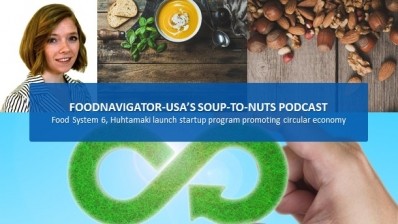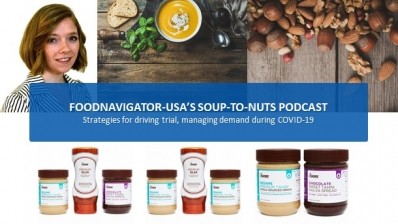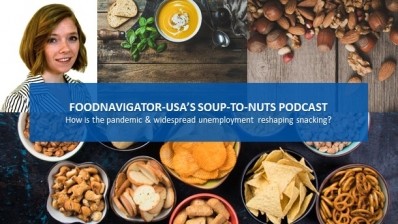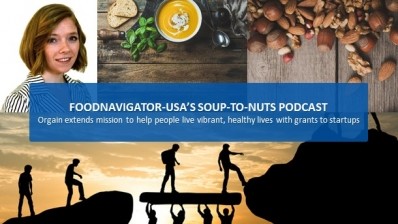Soup-To-Nuts Podcast: ‘Irrational loyalty’ can help brands weather storms for long-term success
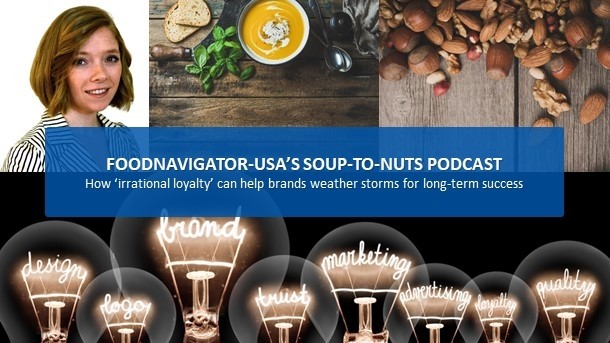
Rather, Sol Marketing CEO Deb Gabor says that companies can win back consumers who have gone astray and even overcome black marks associated with the pandemic, such as having a warehouse or facility associated with an outbreak, by engendering what she calls “irrational loyalty.”
In her recently published book, Irrational Loyalty: Building a Brand That Thrives in Turbulent Times, and in this episode of FoodNavigator-USA’s Soup-To-Nuts podcast, Gabor explains how companies can instill in consumers a lifetime of loyalty that will carry them through both good and bad times. She also shares advice for raising brand awareness without offending consumers during crises and tips for avoiding common missteps.
[Editor’s note: Never miss another episode of FoodNavigator-USA’s Soup-To-Nuts Podcast – subscribe on iTunes.]
Creating ‘irrational loyalty’
According to Gabor, irrational loyalty occurs when consumers are “so indelibly bonded to a brand that they would feel like they were cheating on it they were to choose an alternative” – even if that deviation is under duress, as in the case of the coronavirus pandemic.
Instilling this loyalty is not easy, and Gabor says it has become much more difficult in the past four years with the proliferation of brands, products and ways to buy them. Now, it is no longer enough to offer something unique or even indispensable because the reality is there are many, many companies that offer similar products with similar functional benefits. Instead, to stand out in this competitive landscape, brands increasingly must take stands on issues or demonstrate values that resonate with their core consumers.
“The best brands in the world are the ones that get to this place that they really, really, really tell a story about the person who uses them. And they use their values and beliefs as a magnet to align with the people that they most want to do business with,” Gabor said.
She added, “People are looking to brands for leadership. They’re looking for brands to tell them how to feel, how to act, what to do, what to buy, where to go.”
How a brand that killed three people retained a cult-like following
Gabor explains that the power of irrational brand loyalty – and its power to help smooth over even the worst crises – is best illustrated by consumers’ response to a listeria breakout in a Blue Bell ice cream manufacturing plant in Texas in 2015.
After discovering a problem, Blue Bell closed its plant, took full responsibility, welcomed outside investigators to trace the problem and fully disclosed each step it took. As a result, when the brand reemerged after refinancing several months later, people were lined up out the door, down the street and around the corner to buy a half gallon of its vanilla ice cream.
Last month, the company pleaded guilty to charges it shipped contaminated products linked to the outbreak and the company's former president and CEO was charged with helping to hide the incident, according to the US Justice Department.
“The very definition of irrational loyalty is the fact that you have such a strong relationship with a brand that even when customers are harmed as a result of using that brand, they would come back to it,” Gabor said.
Blue Bell’s story shares many parallels with some of the struggles that food manufacturers are facing during the pandemic – especially the meat and poultry processing facilities that have been deemed essential but are struggling as hotspots for large outbreaks of the potentially lethal coronavirus.
Focus on consumers, employees first
While those facilities' stories are still playing out, Gabor says, the brands that survive and even thrive following the pandemic will be the ones that follow Bluebell’s lead by focusing on their core consumer and their employees’ safety.
“The brands that are going to be able to endure this are the ones that know who their ideal customer is,” and can clearly align with their values, Gabor said. “They put themselves in the shoes of those people and say, ‘What would that person do? What would that person think?’ And they act with that person in mind.”
Based on social media listening and shopper sentiment, Gabor says most brands’ core consumers currently all share a common value of worker welfare and employee safety – making this a key area on which companies should focus if they want to survive the pandemic and following economic downturn.
Market through a lens of helping, not selling
Once brands have ensured their employees’ safety and identified their core consumers’ needs, Gabor says that they can use this to craft unique and memorable marketing message without fear of potentially offending consumers by awkwardly co-opting a crisis.
For example, she recommends scrapping the twinkly piano music with images of health care workers and claims that we are all in this together, and instead focus on how the brand can provide a unique helping hand during the pandemic. That might be showing consumers how to fix their hair at home because they can’t get to a salon or showing them how to use takeout ingredients as shortcut for an easier home cooked meal.
When marketing during a crisis or sensitive period, Gabor also advises companies to avoid several common missteps, including failing to turn-off automated ads, sticking with the status-quote or offering thinly veiled but ultimately self-serving coupon codes.
Connecting online
Gabor provides exponentially more guidance on how brands can navigate crises and come out, if not unscathed than at least still in the running, in her book Irrational Loyalty: Building a Brand That Thrives in Turbulent Times, which can be found on her website www.debgabor.com.
Once there, readers can also learn more about Gabor’s newest venture Authority Lab, which is a way for people to build their brand and monetize their expertise with the help of Sol Marketing. Gabor says the idea came to her while she was exploring online courses, subscription models and community building online – something that has become an everyday reality for many people working remotely or unable to connect at conferences and networking events.
To help illustrate the platform’s potential, Gabor made herself a client and has hosted weekly and sometimes twice weekly free webinars all about how to elevate brands. Check out back webinars and see upcoming ones at debgabor.com.
